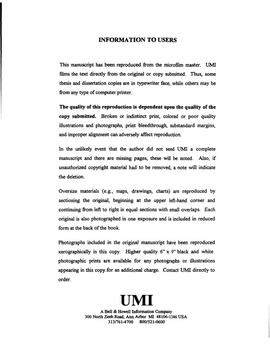| dc.contributor.advisor | Ray, David, | en_US |
| dc.contributor.author | Satterthwaite, Shad Brent. | en_US |
| dc.date.accessioned | 2013-08-16T12:30:00Z | |
| dc.date.available | 2013-08-16T12:30:00Z | |
| dc.date.issued | 1998 | en_US |
| dc.identifier.uri | https://hdl.handle.net/11244/5625 | |
| dc.description.abstract | This research draws upon the framework established by Oliver and Paul-Shaheen (1997). They argue that two general types of elements influence health care reform; contextual conditions and dynamic factors. Contextual conditions, described above, provide the opportunity for decision makers to act. Whether decision makers do so or not, depends largely on the dynamic factors of leadership and information flow. This study closely examines Oklahoma's health care reform efforts in 1992 and 1993. This dissertation points out that while there was certainly an opportunity for reform, key legislators played an important role in getting legislation passed to place medicaid beneficiaries in a managed care system. The study also examines the group politics involved in the reform process. Generally speaking, Medicaid consumers had the least access. Large interest groups, such as the nursing home association and the medical industry, were better represented than Medicaid beneficiaries. Ironically, those with the most influence, such as physicians and hospitals, fared worse than Medicaid consumers when the new managed care program was implemented in Oklahoma. | en_US |
| dc.description.abstract | This dissertation focuses on state policy innovation among Medicaid programs. Budget constraints and a Republican Congress have led states to become more resourceful in the ways which policies are implemented. Medicaid provides a good example, illustrating how many states have adopted managed care in an effort to reduce costs and broaden health care coverage. I too argue that states draw lessons from other states and that ideas pass through the medium or informal networks within state legislative bodies. I further contend that the adoption of managed care for Medicaid recipients is also influenced by other factors indigenous to a state. These factors create a context favorable to reform. To illustrate, I rely on data derived from a pooled cross-sectional time series analysis using variables such as the number of uninsured, the fiscal health of a state, and the number of years states have had HMOs. | en_US |
| dc.format.extent | xi, 222 leaves : | en_US |
| dc.subject | Health Sciences, Health Care Management. | en_US |
| dc.subject | Managed care plans (Medical care) United States States. | en_US |
| dc.subject | Health care reform United States States. | en_US |
| dc.subject | Medicaid. | en_US |
| dc.subject | Political Science, General. | en_US |
| dc.title | Medicaid and the politics of state health care reform. | en_US |
| dc.type | Thesis | en_US |
| dc.thesis.degree | Ph.D. | en_US |
| dc.thesis.degreeDiscipline | Department of Political Science | en_US |
| dc.note | Major Professor: David Ray. | en_US |
| dc.note | Source: Dissertation Abstracts International, Volume: 59-04, Section: A, page: 1324. | en_US |
| ou.identifier | (UMI)AAI9828778 | en_US |
| ou.group | College of Arts and Sciences::Department of Political Science | |
